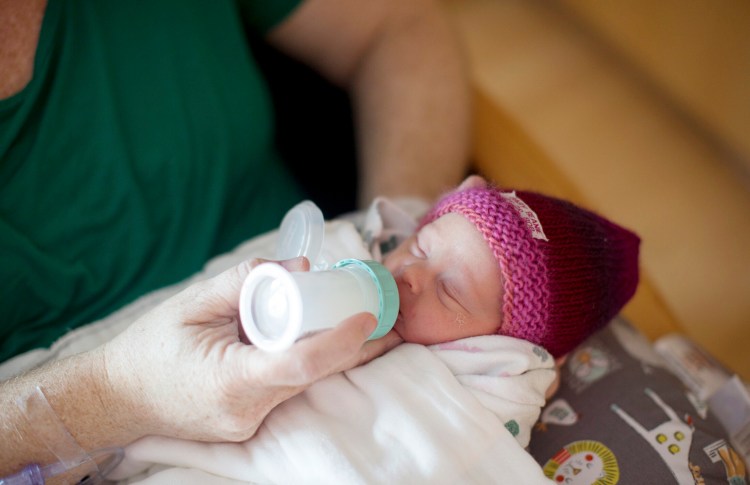In the first few days after Melanie Lord gave birth to her daughter, Lila, at Maine Medical Center this month, she couldn’t produce enough breast milk for her newborn – a common problem that now has a solution at the Portland hospital.
Lord, 42, of Brunswick, obtained donated bottled breast milk from a relatively new program at Maine Med. The human breast milk comes from the Mothers’ Milk Bank Northeast, a Massachusetts-based nonprofit that accepts donated milk and distributes it to 90 hospitals, including Maine Med. Several other Maine hospitals are considering joining the program.
“I didn’t have enough (breast milk) at that time,” Lord said. “By getting the donated breast milk, I was able to keep my daughter out of the NICU (neonatal intensive care unit).”
About 25 percent of all mothers who give birth at Maine Med qualify for the program, most commonly because of a combination of factors, such as delayed lactation, low birthweight, infant’s low blood sugar and, occasionally, because of certain medications the mother is taking, said Sharon Economides, program manager for lactation and childbirth education at Maine Med.
“Mom is doing everything she can, but sometimes it takes a few days for her milk supply to come in. This gives us a bridge to that point,” Economides said.
Cynthia Cohen, director of client relations for Mothers’ Milk Bank Northeast, said the nonprofit is in discussions with five other Maine hospitals – which she would not identify – to add the service. Most hospitals in Massachusetts now offer donated breast milk, and the Mothers’ Milk Bank program has more than doubled in size over the past five years. Northern Light Eastern Maine Medical Center in Bangor has a program at its neonatal intensive care unit.
As the health benefits of breastfeeding have become clearer over the decades, more women have chosen to do so, with breastfeeding rates going from about 20 percent in the early 1970s to 82 percent in 2015, the latest year statistics were available, according to the U.S. Centers for Disease Control. Eighty-five percent of Maine mothers breastfed their babies at least once, the Maine CDC said.
Benefits of breastfeeding include lower risks of asthma, ear and gastrointestinal infections, obesity, diabetes and avoiding other common medical issues.
About 3,000 babies are born at Maine Med every year, while 12,500 babies are born in Maine annually. The program started in the neonatal intensive care unit at Maine Med, but has since expanded to the general maternity wing for mothers who meet the medical risk factor criteria. Mothers who don’t meet the criteria but still feel that they need bottled breast milk can purchase it for $13.50 for a 100-milliliter bottle
Women also can donate breast milk to the program by going to Maine Med. The breast milk is sent from Maine Med to the milk bank in Newton Upper Falls, Massachusetts.
Kara Kaikini, breastfeeding consultant for the Maine CDC, said the idea has “really taken off,” and she expects that many Maine hospitals will be starting programs similar to Maine Med’s in the next several years.
The bottled breast milk program is designed to tide mothers over to when lactation is more productive. Lord used the bottles for the three days she was in the hospital and for several days after she went home. She said she had three risk factors that qualified her for the program – low birthweight, gestational diabetes and her daughter, Lila’s, low blood sugar. Lila was a full-term baby, but her birthweight was low at 4 pounds, 15 ounces.
Nationally, there has been steady growth in bottled breast milk programs, which went from producing fewer than 1 million ounces of breast milk per year in the early 2000s to dispensing more than 6.5 million in 2018, according to the Human Milk Banking Association of North America.
Naomi Bar-Yam, executive director of Mothers’ Milk Bank Northeast, expects that with the benefits so obvious, the bottled breastmilk programs should continue to expand.
“The research has been so compelling. It’s kind of a no-brainer at this point,” Bar-Yam said. “Parents are getting the message. Doctors are getting the message that we need to take this seriously.”
Joe Lawlor can be contacted at 791-6376 or at:
Twitter: joelawlorph
Send questions/comments to the editors.




Success. Please wait for the page to reload. If the page does not reload within 5 seconds, please refresh the page.
Enter your email and password to access comments.
Hi, to comment on stories you must . This profile is in addition to your subscription and website login.
Already have a commenting profile? .
Invalid username/password.
Please check your email to confirm and complete your registration.
Only subscribers are eligible to post comments. Please subscribe or login first for digital access. Here’s why.
Use the form below to reset your password. When you've submitted your account email, we will send an email with a reset code.